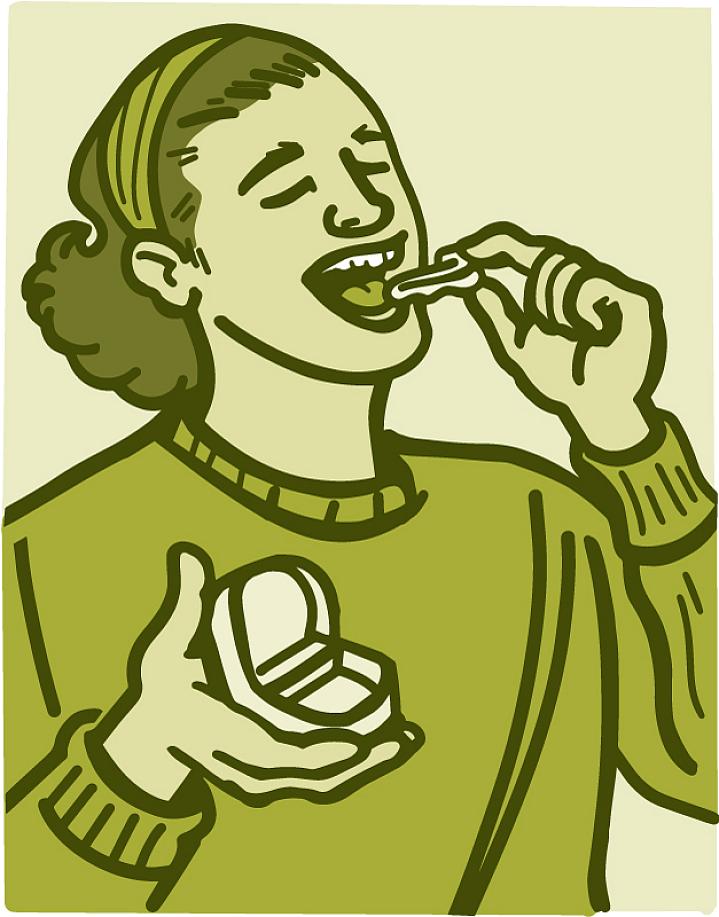Taking on Teeth Grinding and Clenching
Halt Dental Damage and Jaw Pain

Do you wake up with a tired or sore jaw in the morning? It could be a sign that you’re grinding or clenching your teeth at night. Over time, this can damage your teeth and lead to jaw problems. It can cause teeth to crack, loosen, and even fall out.
Teeth grinding and clenching—also called bruxism—can cause serious issues if left untreated. And people aren’t always aware that they’re doing it.
“Someone may not know they grind their teeth at night until they’re told by a bedtime partner,” explains Dr. Dena Fischer, a dental health expert at NIH.
You can grind your teeth during the daytime, too—although clenching your jaw is more common. Some experts think of daytime and nighttime bruxism as separate conditions. They may have different causes.
Your dentist may spot the tell-tale signs of teeth grinding and clenching. These can include wear and early cracks on the outer layer of the tooth. Teeth grinding and clenching can cause a dull headache or tired jaw muscles. Often, nighttime teeth grinding isn’t diagnosed until there are significant symptoms.
Teeth grinding and clenching while awake is easier to recognize. It’s thought to be caused by stress and anxiety. Some people may also grind or clench their teeth while deep in concentration. Once you realize that you’re doing it, it’s important to figure out when and why.
Situations that are stressful or frustrating can trigger the behavior. “People often mention that they grind or clench their teeth while driving in traffic,” Fischer says.
How do you treat bruxism? Fischer helps patients by having them set reminders to check their habits. People who grind or clench their teeth during traffic may find it helpful to put a sticky note on the wheel reminding them to relax their jaw. Setting an alarm to go off regularly at your desk can help if you tend to clench your teeth while deep in thought.
“An alarm or sticky note can be used as a reminder to make sure that your teeth are apart,” Fischer says. “Tell yourself ‘lips apart and teeth apart’ to help make sure clenching isn’t occurring.”
Activities that reduce stress, like yoga and meditation, may help lessen daytime teeth clenching. Counseling can help you learn to manage intense emotions, which may also ease the habit.
If these strategies don’t help, you may consider wearing a plastic mouthguard while awake. Fischer says that a “boil and bite” mouthguard from a store may be enough to stop the problem.
Teeth grinding and clenching at night are usually treated with a mouthguard as well. A dentist can make you a custom fitted guard to protect your teeth. You also may need to be tested for sleep disorders.
Researchers are examining if issues like sleep apnea, which cause people to stop breathing, contribute to nighttime teeth grinding. They’re looking at whether brain activity and sleep stages are linked to sleep bruxism.
If you think you may be grinding or clenching your teeth, talk to a dentist. They can evaluate your mouth and recommend treatments.
Sometimes dentists will recommend reshaping the surfaces of your teeth to change your bite. But Fischer advises against approaches that permanently alter your teeth. She says to seek a second opinion and try less invasive treatment options first.
For more tips to help stop teeth grinding and clenching, see the Wise Choices box.
NIH Office of Communications and Public Liaison
Building 31, Room 5B52
Bethesda, MD 20892-2094
nihnewsinhealth@od.nih.gov
Tel: 301-451-8224
Editor: Harrison Wein, Ph.D.
Managing Editor: Tianna Hicklin, Ph.D.
Illustrator: Alan Defibaugh
Attention Editors: Reprint our articles and illustrations in your own publication. Our material is not copyrighted. Please acknowledge NIH News in Health as the source and send us a copy.
For more consumer health news and information, visit health.nih.gov.
For wellness toolkits, visit www.nih.gov/wellnesstoolkits.



